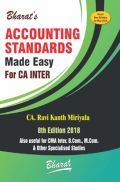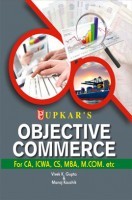This book develops conceptual understanding of the fundamentals of financial accounting which play a crucial role in laying the foundation of commerce and accountancy courses in general and CPT in particular. Dexterously organized to suit the requirements of CPT aspirants, the text presents a step by step analysis of the basic concepts of accountancy in a comprehensive but in an easy-to-grasp manner.
The text begins with discussing the meaning and scope of accounting and moves on by elaborating on different accounting standards, policies and the procedures followed in accounting. It also discusses ledger, trial balance, cash book and bills of exchange or promissory notes in the subsequent chapters. Apart from discussing the various types of accounts, such as partnership accounts and company accounts, this text explains debentures and inventories in a simple and lucid style.
Specifically meant for the prospective examinees of the Common Proficiency Test (CPT), conducted by the Institute of Chartered Accountants of India (ICAI), this text should also prove valuable to undergraduate students of commerce and management.
This book Useful for Management & Commerce students.
1. Meaning and Scope of Accounting
2. Accounting Concepts, Principles and Conventions
3. Accounting Standards: Concepts, Objectives and Benefits
4. Accounting Policies
5. Accounting as a Measurement Discipline: Valuation Principles, Accounting Estimates.
6. Basic Accounting Procedures
7. Ledgers
8. Trial Balance
9. Subsidiary Books
10. Cash Book
11. Capital and Revenue Expenditures and Receipts
12. Contingent Assets and Contingent Liabilities
13. Rectification of Errors
14. Bank Reconciliation Statement
15. Inventories
16. Depreciation Accounting
17. Final Accounts of Non-manufacturing Entities
18. Final Accounts of Manufacturing Entities
19. Consignment
20. Joint Ventures
21. Bill of Exchange and Promissory Notes
22. Sale of Goods on Approval or Return Basis
23. Introduction to Partnership Accounts
24. Treatment of Goodwill in Partnership Accounts
25. Admission of New Partner
26. Retirement of a Partner
27. Death of Partner
28. Introduction to Company Accounts
29. Redemption of Preference Shares
30. Issue of Debentures
Index


















